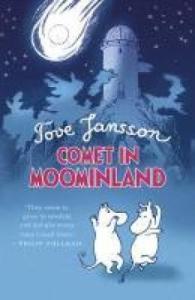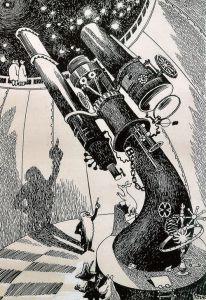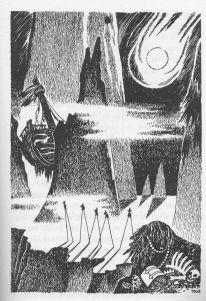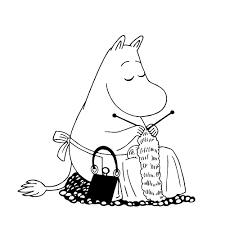In a bid to remind myself that I still know how to read a book, I recently picked up Comet in Moominland by Tove Jansson. It was short and easy, with pictures. I’m pretty sure I read the Moomin books as a child but I had retained no memory of their intrinsic style, though I was aware that their supporters really love them.
 I’d only read a few pages in – Moomintroll and Sniff go exploring and find a strange sign, a star with a tail, carved all over the forest – when I became very curious about Moominmamma. When Moomintroll and Sniff finally return from their adventuring, it’s late and past their supper. Moominmamma does not say, ‘Where the hell have you been?’. She does not say ‘I’ve been out of my mind with worry,’ she just says they should help themselves to something to eat before bed. That night when everyone is sleeping, Moominpappa hears a strange noise outside and finds the philosopher Muskrat in the garden in the rain, complaining that the family’s bridge-building activities have destroyed his habitat. Moominpappa invites him in to stay and tries to provide some hospitality by lumbering about in the kitchen without turning the light on. Naturally, he creates a commotion and some breakages.
I’d only read a few pages in – Moomintroll and Sniff go exploring and find a strange sign, a star with a tail, carved all over the forest – when I became very curious about Moominmamma. When Moomintroll and Sniff finally return from their adventuring, it’s late and past their supper. Moominmamma does not say, ‘Where the hell have you been?’. She does not say ‘I’ve been out of my mind with worry,’ she just says they should help themselves to something to eat before bed. That night when everyone is sleeping, Moominpappa hears a strange noise outside and finds the philosopher Muskrat in the garden in the rain, complaining that the family’s bridge-building activities have destroyed his habitat. Moominpappa invites him in to stay and tries to provide some hospitality by lumbering about in the kitchen without turning the light on. Naturally, he creates a commotion and some breakages.
Moominmamma came running downstairs with a candle in her paw.
‘Oh! It’s you,’ she said. ‘I thought someone must have broken in.’
‘I wanted to get the palm-tree wine down,’ said Moominpappa, ‘and some silly fool had put that stupid vegetable dish right on the edge of the shelf.’
‘Never mind,’ said Moominmamma. ‘it’s really a good thing it’s broken – it was so ugly. Climb up on a stool, dear – it will be easier.'”
I was so struck by this exchange that I read it out loud to Mr Litlove. ‘Tell me what’s wrong with this scenario,’ I invited him.
He shot me the sly side-eye. ‘They don’t make wives like they used to?’
‘No one makes wives like that,’ I said. ‘The real Moominmamma would say, “What in the world did you think you were playing at, rummaging in the cupboard without turning the light on? Now you’ve broken my best dish and ruined tomorrow’s dinner to boot.” I’m trying to decide whether it’s dangerous to mislead children this way.’
When on the following day, Moomintroll and Sniff come running in at the sound of the lunch gong, only to demand sandwiches to eat out, and Moominmamma does not say, ‘What? Are you crazy? Go and sit down and eat what I’ve cooked for you,’ but simply complies, I began to believe she was operating under the influence of some powerful sedatives.
No, I’m messing with you. I didn’t really believe that, but I was intrigued by this image of overly perfect motherhood, and Moominmamma as this serene, loving, center of the world whose presence assures comfort, certainty and security.
 But of course, it’s just as well that she does, because what follows is a delightful tale of environmental apocalypse. The Muskrat informs Moomintroll that the strange signs they keep seeing are indications of the imminent arrival of a comet, an event which will probably destroy the world they live in. And so Moomintroll decides to take a long and perilous trip to the distant Observatory on the Lonely Mountains where he might get some better information. This being an age in which experts are still respected for their knowledge and no one is running counter-interference on the comet rumor as idle speculation or myth. He and Sniff set out with bags lovingly packed by Moominmamma (whose insistence on including woolen trousers will prove fortuitous) and begin a dangerous, adventure-packed journey, that will find them close to death on many occasions. But the journey will also present all kinds of developmental possibilities – Moomintroll falls in love with the Snork Maiden and rescues her, Sniff comes a cropper on a couple of occasions over his desire for all that twinkles, but learns nothing, alas – and will bring them a number of useful traveling companions. They will team up with the experienced and wise Snuffkin, with the analytical Snork, and the sweet, courageous Snork Maiden.
But of course, it’s just as well that she does, because what follows is a delightful tale of environmental apocalypse. The Muskrat informs Moomintroll that the strange signs they keep seeing are indications of the imminent arrival of a comet, an event which will probably destroy the world they live in. And so Moomintroll decides to take a long and perilous trip to the distant Observatory on the Lonely Mountains where he might get some better information. This being an age in which experts are still respected for their knowledge and no one is running counter-interference on the comet rumor as idle speculation or myth. He and Sniff set out with bags lovingly packed by Moominmamma (whose insistence on including woolen trousers will prove fortuitous) and begin a dangerous, adventure-packed journey, that will find them close to death on many occasions. But the journey will also present all kinds of developmental possibilities – Moomintroll falls in love with the Snork Maiden and rescues her, Sniff comes a cropper on a couple of occasions over his desire for all that twinkles, but learns nothing, alas – and will bring them a number of useful traveling companions. They will team up with the experienced and wise Snuffkin, with the analytical Snork, and the sweet, courageous Snork Maiden.
 The news from the Observatory is bad: the comet is due to strike on the 8th October at 8.42pm and four seconds. The friends hurry back home to the Moomin Valley, but as they go, so the comet comes nearer and nearer, blocking out the sun, drying up the seas and rivers, and generally causing all kinds of climate change mayhem.
The news from the Observatory is bad: the comet is due to strike on the 8th October at 8.42pm and four seconds. The friends hurry back home to the Moomin Valley, but as they go, so the comet comes nearer and nearer, blocking out the sun, drying up the seas and rivers, and generally causing all kinds of climate change mayhem.
What matters is teamwork. The friends work together to overcome obstacles, evade dangers and make it back home. Their perspective is entirely inclusive – even the morose transgender Hemulen is rescued by them (though in all fairness, his bad temper is partly due to the fact they ruin his dress by using it as a balloon to out-fly a tornado). They make it back in time to warn the parents and pack up the home, taking their belongings to a nearby cave. Even Moominmamma wigs out a bit at this point, which shows you quite how stressful an approaching apocalypse must be. But as they await the end of the world together, the comet zooms through the valley, missing the earth by inches, and hurtles back out into the wilderness of space.
So what are we to learn from this story? The internal moral works this way: if you are close to a loving mother, you will be safe from harm. Moominmamma – or even just the thought of Moominmamma – looms large over this tale, the guarantor of peace and security. For it’s the generosity and affectionate, open inclusiveness of the Moomins that sees them through. Together they are stronger, and that togetherness is based on an explicit diversity of species. All those differences bring with them other essential forms of knowledge and resource. Compassion and wisdom avert oblivion.
It occurred to me that in our contemporary world we look to science and technology to save us, and to give us what fragile security we have. But is this wise? In the story, science is impressively informative. The comet really does pass the earth at 8.42pm and four seconds. But that all important sense of safety can only be gained from the community, and one founded on the ideal of the loving mother.
 The story is a myth. Mothers don’t need to be as perfect in reality as Moominmamma is. But what we do need is that ideal of love in our hearts and minds, because it gives courage and it neutralises fear. It’s the only way to face whatever lies ahead and maybe, just maybe, avoid disaster.
The story is a myth. Mothers don’t need to be as perfect in reality as Moominmamma is. But what we do need is that ideal of love in our hearts and minds, because it gives courage and it neutralises fear. It’s the only way to face whatever lies ahead and maybe, just maybe, avoid disaster.
